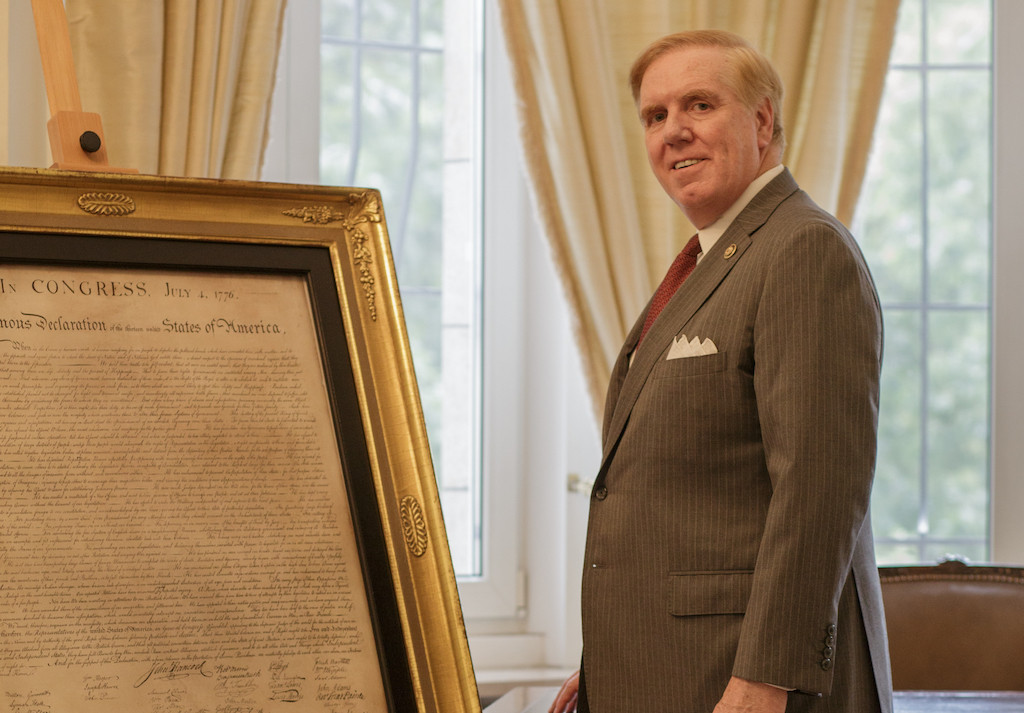“It's been a phenomenal exercise in democracy,” says Randy Evans of the 2020 US election that has seen over 143 million Americans cast their vote for either Donald Trump or Joe Biden. But, as the world waits with bated breath for the outcome, the United States ambassador to Luxembourg says that it is important for the electoral process to work properly. “I think you're seeing everybody work very deliberately through the process,” says Randy Evans, “to make sure that the system works, and that every ballot gets counted. It would have been pretty easy to short circuit the process, but that didn't happen.”
As legal challenges are launched and after president Trump on Wednesday threatened to go to the Supreme Court, commentators are inevitably likening the situation to the George W. Bush versus Al Gore election. But Evans, who as a lawyer was counsel to House of Representatives Speaker Dennis Hastert during those tumultuous weeks in November and early December 2000, says that it is too early to make that comparison.
“We're still in the same week as the election itself,” he says in an interview on Thursday afternoon. Back in 2000, the outcome was not known until weeks after election day. “It was eventually the US Supreme Court that had to roll before we had a final decision. And, truthfully, we didn't even have a final decision, then,” Evans explains. “We still had to wait for the convening of the joint session of Congress to count the electoral votes. It's not often reported in the media. But there were lots of things that happened on the day that Congress met...everything from objections being made to certain delegations to motions to stay.”
Alternative scenarios
But even if the legal process does drag out, Evans explains that a decision has to be made by 20 January 2021. “Because on January 20, if the process has not yet completed, then the speaker becomes the acting president.”
Equally interesting is the thought that the presidential election could be tied, with neither candidate receiving the required 270 electoral college votes. That could happen if Biden wins Georgia and Trump wins Nevada, Arizona, Pennsylvania and North Carolina. In that case the House of Representatives gets to vote for the president and the Senate votes for the vice-president.
“Well, you know, it's interesting, because I was there when we revised some of these rules. And I remember people saying, ‘what are the chances that that could ever happen?’ But that's why due process is so important,” says Evans.
The ambassador says he finds it fascinating that the race for the White House is going down to the wire after both sides were publicly proclaiming that they would win by significant margins. “And what we now know, is that it is coming all the way down to these final five states. We're talking about a few thousand votes. We don't have a blowout. And that I think that in itself will in some ways change the narrative of American politics.”
As for the transition period, between a final result being declared and the 20 January inauguration, the ambassador explains that “nothing as a legal matter changes in terms of the powers of either the president or the Congress or of the courts.” In fact, he recalls that up until 1937, the inauguration of the president used to be in March, rather than January.
Most powerful position on Earth
The current Congress expires in the first week of January, but with Evans’ home state of Georgia holding one, possibly two, senate run-off elections early next year the precise make-up of the upper chamber may not even be known by then.
But the first act the new Congress must perform is “receive, accept and act on the votes cast by the various electors [from the electoral colleges of each state]. It's binary, there's only one option or the other. Either one of the two candidates has 270, or more electors, or they don't.”
With that decision still in the balance, Evans agrees that to the outside world the process may seem surreal, but that it is indicative of how seriously the United States takes its elections, which he calls “the cornerstone of a democratic republic.”
Making sure that ballots are properly counted, and then making sure that the appropriate checks and balances happen is essential he says. “And those checks and balances consist of everything from the court system to the political system…to make sure that the person who is named president is truly, completely, verifiably, the person who won the requisite number of votes, both at the ballot box, and then at the electoral college…that everybody has weighed in, because the presidency is the most powerful position on planet Earth.”
